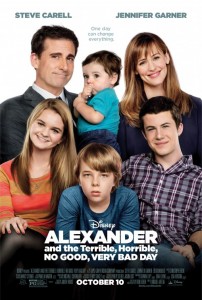The Judge
Posted on October 9, 2014 at 6:00 pm

Robert Downey Jr. gives his best performance since “Chaplin” in “The Judge,” an absorbing story of family, redemption and home.
Downey co-produced and stars as Hank Palmer, a Chicago criminal defense attorney known for doing whatever it takes to get his clients a “not guilty” verdict. Hank relies on his two strengths and his belief in a third. He has a restless intelligence that operates like a perpetual random radar signal going off in every direction at once. As we will see in a sensational bar scene where he sizes up some guys heading towards him with fight in their eyes, Hank can size up a situation and formulate a dazzling verbal response in an instant. But that same intelligence also makes him impatient and dismissive.
Hank also has a coping mechanism for keeping him focused that has worked very effectively. It is basically not to think too much about anything but winning. Other lawyers in the movie will talk about their view of the law — that it is a mechanism for making sure individuals take responsibility for the consequences of their actions, that it is the one place where everyone is equal. Hank’s professional career has been dedicated pretty much to proving the opposite.
And Hank thinks of himself as a devoted father to his little girl, Lauren (Emma Tremblay of “The Giver”) because he loves her dearly, though, as his estranged wife points out, he cannot name her teachers, best friends, or favorite color.
These two skills and one inflated idea are what sustain Hank, and over the next seven months, he will have to give up all three to explore who he is, where he came from, and how these protective mechanisms are no longer keeping him safe but keeping him stuck. The greatest pleasure of this film is seeing Downey’s responses as a man who is very, very good at what he does learn that none of that is of any help to him.
We first see Hank taunting his opposing counsel in the courthouse men’s room. “I respect the law,” he says. “I’m just not encumbered by it.” He is representing a man he knows to be guilty of massive financial fraud. As the trial begins, he gets a message that his mother has died. Hank, who has assembled the life he thought would make him happy, a fancy home, a fancy car, a beautiful wife, will have to do something he has been avoiding for years. He will have to return to his small hometown, Carlinville, Indiana. While it is his father who is a judge by profession, either could be the title character. Hank has done a lot of judging of those around him and, like his father, he has found just about everyone not up to his standard.
The golden, elegiac tones provided by master cinematographer Janusz Kaminski and steeped in tradition, slightly formal soundtrack from Thomas Newman introduce us to the town. Hank pays his respects to his mother with his brothers, sweet-natured, developmentally disabled Dale (Jeremy Strong), who always carries his Super 8 movie camera, and Glen (Vincent D’Onofrio), a once-promising athlete who was injured and stayed in town to run a tire store. His father, the judge (Robert Duvall), is presiding. Hank watches from the balcony. Some things never change. His father still tells defendants that “Yeah” is not the way to speak in a courtroom.
But some things have changed. The judge cannot remember the name of his longtime bailiff. Hank suspects his father, sober for many years, may have started drinking again.
And then the judge is accused of murder. The night of the funeral, he was driving in the rain. A man riding a bicycle is dead, his blood on the judge’s fender. The dead man and the judge had a history. Hank wants to defend his father, mostly because he is still hungry for his father’s approval and this will give him a chance to show the judge what he does best. He may not be much to brag about outside the courtroom, but inside the court is where he lives. That is something Hank and his dad share.
Co-writer and director David Dobkin is best known for wild, raunchy comedies like “The Wedding Crashers.” Like Hank, and like the man who plays him, Dobkin here moves to the grown-up table with a rich, thoughtful, beautifully structured film, with moments of humor that are among the funniest you will see this year. The jury selection scene is a treat all its own.
It would be enough just to get a chance to see Downey show how much more he is capable of than even his brilliant work as Tony Stark or in small gems like “Kiss Kiss Bang Bang” and “The Wonder Boys.” Here he gives a master class in acting, never less than fully present in showing us Hank’s layers of protection and the deep yearning for connection they cannot hide. The open-heartedness and vulnerability of this performance are deeply moving, a gift from Hank the character and from the man who plays him. But this is an enormously wise and moving story, beautifully told.
Parents should know that this film has strong and crude language, sad deaths of parents, infidelity and divorce, serious car accidents with injuries and death (nothing explicit), graphic depiction of various bodily functions and fluids, gastrointestinal distress foilowing cancer treatment, sexual references, drinking and discussions of alcohol abuse and drug use
Family discussion: How were Hank and his father alike? What made it hard for them to get along?
If you like this, try: “The Client” and more films from Robert Downey, Jr. (“Chaplin,” “The Avengers”) and Robert Duvall (“The Apostle,” “Tender Mercies”)



